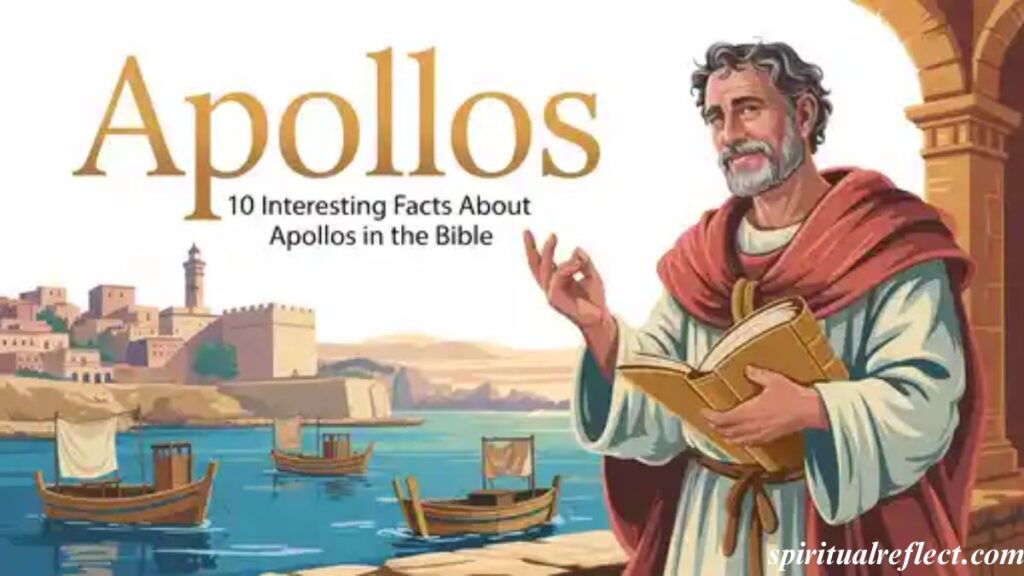The phrase “10 Interesting Facts About Apollos in the Bible” refers to key insights about one of the most fascinating yet often overlooked figures in the New Testament. Apollos was a Jew from Alexandria, known for his eloquence, deep understanding of the Scriptures, and influential role in the early Christian Church. His story, found mainly in the Book of Acts and Paul’s letters, reveals a man of great faith, learning, and humility, whose ministry helped shape the foundation of early Christianity.
What makes Apollos stand out is his unique blend of intellect and passion. He combined the sharp reasoning of Greek philosophy with the spiritual devotion of Jewish teaching, creating a powerful voice for the Gospel. His life captures the beauty of growth — from limited understanding to mature faith — making his journey both inspiring and relatable.
In exploring these 10 interesting facts about Apollos in the Bible, you’ll uncover his background, education, ministry partnerships, and spiritual development. Each fact reveals how Apollos became a model of Christian leadership, biblical knowledge, and humble service. His story is not just ancient history; it’s a timeless example of how wisdom, humility, and faith can transform lives and strengthen the Church today.
Apollos Was a Jew from Alexandria, Egypt
According to Acts 18:24, “a Jew named Apollos, a native of Alexandria, came to Ephesus. He was an eloquent man, competent in the Scriptures.”
That one verse tells us a lot.
A Native of Alexandria
- Alexandria, in Egypt, was one of the largest and most learned cities of the ancient world.
- It hosted the famous Library of Alexandria, a symbol of scholarship and intellectual exchange.
- The city also had a large Jewish population, including scholars who helped translate the Hebrew Scriptures into Greek (the Septuagint).
This cultural setting meant Apollos likely received education steeped in both Jewish theology and Greek rhetoric — a rare and powerful combination.
| Background Element | Description | Relevance to Ministry |
|---|---|---|
| Jewish heritage | Rooted in Scripture and covenant faith | Deep understanding of the Old Testament |
| Greek education | Training in philosophy and oratory | Ability to reason and debate effectively |
| Alexandrian influence | Exposure to diverse worldviews | Prepared him for multicultural audiences |
Apollos’ dual background made him an early example of cross-cultural ministry — bridging ancient Jewish faith with emerging Christian teaching.
He Was Eloquent and Knowledgeable in the Scriptures
The Book of Acts praises Apollos as “eloquent and mighty in the Scriptures.” Those few words pack a punch.
In the Greek text, “eloquent” can also mean learned — someone trained in reasoning, public speaking, and persuasive argument. Alexandria’s emphasis on Greek philosophy and logic likely shaped his communication style.
Apollos didn’t just speak beautifully — he understood deeply. His teaching flowed from a rich knowledge of the Hebrew Bible, especially the prophetic writings pointing to the Messiah.
Traits That Defined Apollos’ Teaching
- Eloquent: He articulated truth with precision and grace.
- Knowledgeable: He was well-versed in the Scriptures.
- Fervent: Acts 18:25 describes him as “fervent in spirit,” meaning passionate and sincere.
- Accurate: He “taught accurately the things concerning Jesus.”
In a world where oratory often determined influence, Apollos’ words carried weight — not because they flattered, but because they rang with theological accuracy and spiritual power.
He Knew Only the Baptism of John
One of the most intriguing details about Apollos in the Bible appears in Acts 18:25:
“He had been instructed in the way of the Lord; and being fervent in spirit, he spoke and taught accurately the things concerning Jesus, though he knew only the baptism of John.”
What Did “John’s Baptism” Mean?
- It was a baptism of repentance introduced by John the Baptist.
- It prepared hearts for the coming Messiah but didn’t yet include understanding of the Holy Spirit or Christ’s resurrection.
- In short, Apollos’s theology was accurate but incomplete.
The Lesson
Apollos illustrates that spiritual knowledge grows in stages. Even a skilled teacher must remain teachable. His limited understanding didn’t stop him from serving — it simply became the next step in his learning journey.
Priscilla and Aquila Helped Teach Him the Full Gospel
When Apollos preached in Ephesus, a remarkable couple named Priscilla and Aquila listened closely. They realized his message lacked a few key truths about Jesus and the Holy Spirit, so they quietly took him aside.
“They took him aside and explained to him the way of God more accurately.” – Acts 18:26
This scene offers one of the most beautiful examples of mentorship in the New Testament Church.
Why This Moment Matters
- It shows humility on both sides: Priscilla and Aquila corrected privately, not publicly; Apollos listened without pride.
- It highlights the role of women in teaching ministry — Priscilla’s name even appears before her husband’s in several verses, suggesting leadership.
- It demonstrates that accurate theological correction strengthens ministry rather than diminishes it.
Quote: “True wisdom is not in knowing everything, but in being willing to learn from anyone.” – Anonymous
Apollos’s willingness to learn from tent-makers shows the heart of a teachable servant leader — an example every modern teacher or preacher can emulate.
Apollos Powerfully Preached in Achaia and Corinth
After his time in Ephesus, Apollos traveled to Achaia, the province that included Corinth.
Acts 18:27-28 tells us that the believers encouraged him to go and sent letters of recommendation ahead. When he arrived, “he greatly helped those who through grace had believed.”
His Ministry in Achaia
- He strengthened believers, confirming their faith in Jesus the Messiah.
- He refuted Jewish opponents publicly, using Scripture to prove that Jesus fulfilled the prophecies.
- His preaching was both bold and biblically grounded.
| Ministry Focus | Action | Result |
|---|---|---|
| Evangelism | Publicly reasoned from Scripture | Convincing proof that Jesus is the Messiah |
| Discipleship | Strengthened existing believers | Church growth and confidence in doctrine |
| Apologetics | Refuted misunderstandings | Defended faith using reason and Scripture |
Apollos’s combination of intellect and faith made him one of the earliest examples of Christian apologetics — defending truth through reasoned argument and Scriptural authority.
Paul Considered Apollos a Fellow Servant in Ministry
There’s a common misconception that Paul and Apollos were rivals. In reality, Scripture paints them as partners in ministry — distinct yet complementary.
Paul’s Perspective
In 1 Corinthians 3:5-6, Paul writes:
“What, after all, is Apollos? And what is Paul? Only servants, through whom you came to believe — as the Lord has assigned to each his task. I planted the seed, Apollos watered it, but God has been making it grow.”
That verse beautifully summarizes ministry collaboration.
- Paul focused on church planting — initiating the mission.
- Apollos specialized in teaching and nurturing — helping believers mature.
- God produced the growth.
A Partnership Built on Respect
Paul later refers to “our brother Apollos” in 1 Corinthians 16:12 — a sign of affection and equality.
He even asked the church to help Titus and Zenas support Apollos on his journey (Titus 3:13).
Quote from Paul’s imagery: “I planted, Apollos watered, but God gave the growth.”
This timeless reminder keeps focus where it belongs — on God’s power, not human fame.
Apollos Became a Respected Leader in the Corinthian Church
Apollos’ ministry in Corinth was so influential that some believers began aligning themselves under his name.
In 1 Corinthians 1:12, Paul rebukes this behavior:
“One of you says, ‘I follow Paul’; another, ‘I follow Apollos’; another, ‘I follow Cephas’; still another, ‘I follow Christ.’”
The Problem
- The Corinthian church was dividing into factions based on preferred teachers.
- These divisions threatened the unity and spiritual maturity of believers.
Apollos’ Response
While the text doesn’t record Apollos’ own words, the context implies humility. He never encouraged such factions and continued cooperating with Paul.
This restraint reveals his character — focused on truth, not pride.
| Lesson | Modern Application |
|---|---|
| Avoid personality cults | The church belongs to Christ, not to any human teacher |
| Maintain unity | Diverse gifts strengthen, not split, the body |
| Lead with humility | Influence should serve, not dominate |
In many ways, Apollos became a model for Christian leadership development — strong in conviction, yet humble in spirit.
Apollos Might Have Written the Book of Hebrews
The authorship of Hebrews remains one of the greatest mysteries in biblical scholarship. While the writer’s identity is unknown, Apollos has long been a serious candidate.
Why Some Scholars Support the Apollos Theory
- Greek Mastery: Hebrews is written in elegant Greek, matching Apollos’ Alexandrian education.
- Old Testament Expertise: The book shows deep theological accuracy and Scriptural insight, consistent with what Acts says about Apollos.
- Hellenistic Style: The logical argumentation resembles Alexandrian thought.
- Anonymous Authorship: Apollos, known for humility, may have intentionally omitted his name.
Interesting Note: Martin Luther (the Reformer) was among the first to suggest Apollos as the author of Hebrews.
Whether or not he wrote it, the very fact that scholars connect him with such a profound work shows the depth of his influence on early Christian theology.
Titus and Zenas Were Sent to Help Apollos
Another glimpse into Apollos’ ministry life comes from Titus 3:13:
“Do everything you can to help Zenas the lawyer and Apollos on their way and see that they have everything they need.”
What This Reveals
- Apollos remained active in missionary work long after his time in Corinth.
- Titus, a trusted associate of Paul, coordinated resources and support for him.
- The early church practiced team ministry — a network of teachers, pastors, and servants helping each other succeed.
This verse highlights a practical side of ministry often overlooked: logistics, travel, and mutual encouragement. It reminds us that effective ministry relies not only on preaching but also on organized support and cooperation.
Apollos Modeled Humility and Personal Growth
Among all the facts about Apollos in the Bible, his humility might be the most compelling.
Started as an eloquent teacher but accepted correction from tent-makers. He became a powerful preacher yet refused to fuel division. He worked alongside Paul, Priscilla, Aquila, Titus, and Zenas — always focusing on faith, not fame.
Character Traits That Defined Apollos
| Trait | Example | Modern Application |
|---|---|---|
| Humility | Accepted instruction from Priscilla and Aquila | Stay teachable regardless of expertise |
| Servant leadership | Worked with Paul, not against him | Collaboration over competition |
| Faithfulness | Continued missionary work after Corinth | Perseverance in service |
| Spiritual maturity | Preached Christ, not himself | Keep focus on the Gospel |
Apollos demonstrates that real growth happens when learning meets obedience.
His story is the journey of a disciple who became a teacher, a man whose spiritual maturity matched his intellect.
Summary Table — Ten Facts About Apollos in the Bible
| Fact | Description | Key Takeaway |
|---|---|---|
| Jew from Alexandria | Blended Jewish and Greek culture | Education shaped his ministry |
| Eloquent and knowledgeable | Skilled speaker and Scripture scholar | Combined intellect with passion |
| Knew only John’s baptism | Incomplete understanding | Growth comes through correction |
| Taught by Priscilla & Aquila | Mentored in the Gospel | Mentorship fuels maturity |
| Preached in Achaia & Corinth | Helped the church but stayed humble | Bold teaching builds faith |
| Partnered with Paul | “Paul planted, Apollos watered” | Ministry is teamwork |
| Leader in Corinth | Acceptedthe correction and grew | Influence must not breed pride |
| Possible author of Hebrews | Scholar with deep theology | Intellectual faith glorifies God |
| Supported by Titus & Zenas | Engaged in missions | Helped the church but stayed humble |
| Model of humility | Accepted the correction and grew | Accepted the correction and grew |
Lessons Modern Christians Can Learn from Apollos
Apollos’ life, though briefly recorded, offers enduring lessons for Christian discipleship and leadership:
- Never stop learning.
Spiritual maturity grows through study, correction, and openness to truth. - Blend intellect with humility.
Knowledge without grace becomes pride; grace without knowledge lacks depth. - Value teamwork.
Ministry collaboration multiplies impact — no one serves effectively alone. - Guard against division.
Focus on Christ, not personalities or preferences. - Teach accurately.
Be diligent in understanding and conveying Scriptural authority. - Stay passionate.
Like Apollos, remain fervent in spirit — enthusiasm ignites transformation.
conclusion
In reflecting on the 10 Interesting Facts About Apollos in the Bible, it’s clear that Apollos was more than just a preacher — he was a bridge between knowledge and faith. His story shows how learning, humility, and spiritual growth can work together to shape a true servant of God. From his beginnings in Alexandria to his powerful preaching in Corinth, Apollos used his gifts to spread the Gospel and strengthen the early Church.
The 10 Interesting Facts About Apollos in the Bible remind us that God values both wisdom and willingness to learn. Apollos’ life is a model for anyone seeking to serve with both heart and mind. His faith, eloquence, and teachable spirit continue to inspire believers today, proving that genuine growth begins when knowledge meets humility and truth leads to transformation.

Rana Ahmad is the creator of Spiritual Reflect, where she shares insights on personal growth, mindfulness, and meaningful living to inspire a more intentional life.







